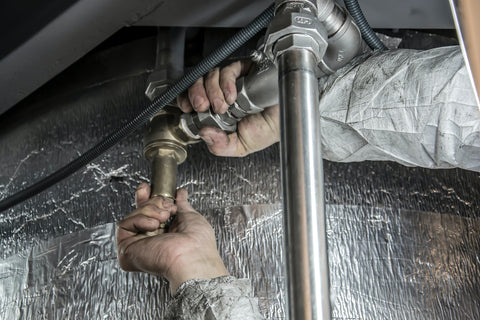My House Smells! 5 Common Culprits
Your nose scrunches. Your eyes narrow. “What’s that smell?” you ask your spouse while sitting on the couch watching a movie. If your house smells funny, there could be a number of explanations. In this blog, let’s explore some of the more common home odors, and what you can do about them if your house is starting to smell a little… funky.
5 Potential Sources if Your House Smells
While this list isn’t exhaustive, it should give you a good place to start.
1. Your Cooking
We hate to say it, but it might very well be your cooking (which we know is delicious) that’s stinking up the home. Whether you’ve got an electric or gas stove, if your cooking produces any smoke, that could get trapped in your home, linger for days, and leave it smelling pretty yucky. Furthermore, if you tend to burn the food a lot (no judgment) — whether it was your first attempt at baking bread or you overheated some oil on the stovetop — it can leave your home smelling less than pleasant.
Ideally, your food shouldn’t be smoking all that much — especially cooking oils (that can be dangerous!). If there is a little smoke, consider cracking open a window. If anything splatters during the process, be sure to clean it up right after. This includes the stovetop, oven, and the inside of the microwave.
2. Mold or Mildew
Do you smell something musty, earthy, or even a little rotten? It could be mold. Mold thrives in damp environments, so look to your bathrooms and laundry room for the source. Mold is fuzzy and can take on a variety of colors, although it’s commonly black. Mold occurs naturally in the outdoor environment, and a little won’t cause much harm. But left unaddressed in the home, it can lead to mold sickness.
Hampering mold growth is simple: Keep the air dry. After you bathe, leave the door open and crack a window to let all the steam out. Be sure there’s plenty of airflow and ventilation in your laundry room. If the inside of your home is too moist, consider a dehumidifier.
3. A Gas Leak
Many homes in America utilize natural gas. But because it’s odorless and colorless, you might not immediately know if there’s a gas leak in your home. For this reason, many gas companies add an odor to their gas that smells of rotten eggs. So, if you smell something egg-y and didn’t cook an omelet that morning, something’s up.
If you suspect there’s a gas leak in your home, you should leave immediately and contact the gas company. Stay away from your home until they’ve told you it’s safe to return.
4. Faulty Electrical Wiring
Ironically, if an electrical component in your home is overheating or burning, it won’t always smell like smoke. Sometimes, it can smell fishy! There could be a number of sources, including an overloaded circuit, faulty outlet, or incorrectly sized fuses. Call your electrician, because if a professional doesn’t investigate, it could lead to a fire.
5. Clogged Plumbing
Does your house smell like sewage? It could very well be a plumbing problem. A pipe could be clogged, or you could have a broken sewer pipe. For any sinks, bathtubs, or showers that you use regularly, pull out the drain and ensure it’s not packed with hair, skincare products, or any other gunk.
If you have any bathrooms in your home that aren’t regularly used, you should still visit them at least once a week to run the water and flush the toilet. This helps to keep the traps full. (The trap is the channel that leads to the drainpipe.) The reason that this is important is that if a trap is evaporated, it’ll let sewer gas into the home, and that can make any odors worse.
For more stubborn clogs or plumbing issues that you’re not able to troubleshoot on your own, call a plumber! It’s worth paying for their expertise because even small plumbing issues — left unfixed — can turn into giant, expensive messes.

On that note, when in doubt, call a professional. Yes, you can save some money by “DIY-ing” it. But sometimes, it makes much more sense to have a professional address any and all issues.
How to Eliminate Any Lingering House Smells
Ideally, you address any foul odors at the source. However, even the best attempts at eliminating unpleasant smells can fall short. For pesky stenches that just won’t go away, an air purifier can be of immense help.
Look for an air purification system with multiple layers of defense. This is necessary because no single layer will be able to capture all of the particles floating in the air you breathe. For instance, a medical-grade HEPA 13 filter can trap everything from dust to pet hair to dander. However, an activated carbon filter is needed for targeting odors and gases — like radon, smoke, carbon monoxide, and volatile organic compounds (VOCs).
Be sure to opt for a replaceable filter and not a washable one. Washable filters are very tricky to actually get clean, and you end up exposing yourself to all of the dangerous particles that they trapped. Ideally, your air purifier should alert you when it’s time to replace your filter so that it can continue running optimally and help to protect your health.
The Sans air purifier is “meditation quiet,” so it’ll never disturb you at night or during the workday. It’s self-regulating and monitors the air in real time, so it always knows when to kick into gear. Ready to get ahead of your health, kick funky odors to the curb, and breathe a little easier? Shop with us today.
